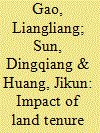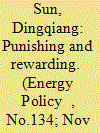| Srl | Item |
| 1 |
ID:
156469


|
|
|
|
|
| Summary/Abstract |
The goal of this paper is to examine the impact of changes in China's rural land policy on agricultural investments. Dramatic changes occurred in China's rural land policies after 2000, including the extension of rural land contractual period, restriction of land reallocation among villages and villagers groups, elimination of agricultural taxes for responsibility land, and rapid development of rural land rental markets. These changes have given farmers more secure tenure on collectively controlled responsibility land and have strengthened farmers' income rights for responsibility lands, incentivizing them to increase their investments on responsibility lands. A panel data method was used to quantitatively investigate the impact of land policy changes on agricultural investment. We considered the application of organic fertilizer as an indicator for long-term agricultural investment, and compared the use of organic fertilizer between private plots and responsibility lands operated by the same household. The results showed that the difference in organic fertilizer use between private plots and responsibility land for the same household has become smaller from 2000 to 2008. Our findings suggest that recent changes in rural land policies have provided farmers incentives to increase land quality investment on their responsibility lands.
|
|
|
|
|
|
|
|
|
|
|
|
|
|
|
|
| 2 |
ID:
169735


|
|
|
|
|
| Summary/Abstract |
Crop straw is the most important source of domestic energy in rural areas of many developing countries. However, as household income grows, rural residents begin to disuse crop straw, leading to a serious pollution and waste of biomass resources. This paper empirically examines the effect of public policy on crop straw use in the case of Jiangsu Province of China. Policy measures, such as burning ban and incentive programs for comprehensive use of crop straw, have important implication for rural energy supply and sustainable development of agriculture. Our results show that the burning ban has reduced crop straw burning in open field dramatically and driven farmers to retain straw into soil in sample areas. Straw retention subsidy, however, seems to play an insignificant role as the subsidy was low and not directly delivered to farmers. Moreover, crop straw markets in Jiangsu are inactive due partially to high cost of collecting and transporting crop straw, which may impose a big chanellge for straw-based energy plants that require larger scale and stable supply of crop straw. Our findings provide critical knowledge on designing and reforming current programs for crop straw management.
|
|
|
|
|
|
|
|
|
|
|
|
|
|
|
|